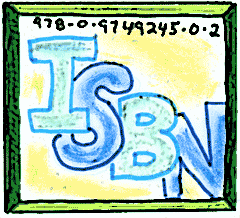 In the world of book publishing, the ISBN is one of the most important numbers you will encounter. ISBN stands for International Standard Book Number, so technically the term “ISBN number” is redundant, although everyone calls it that anyway. As of January 2007, the number is 13 digits (prior to that time, it was 10 digits) and it uniquely identifies a book and its publisher. The number is made up of five parts:
In the world of book publishing, the ISBN is one of the most important numbers you will encounter. ISBN stands for International Standard Book Number, so technically the term “ISBN number” is redundant, although everyone calls it that anyway. As of January 2007, the number is 13 digits (prior to that time, it was 10 digits) and it uniquely identifies a book and its publisher. The number is made up of five parts:
- A “978” prefix
- A group or country identifier;
- The publisher identifier;
- The title identifier, which is for a particular title or edition;
- A “check digit” at the end, which validates the ISBN
So for example, our book Happy Tabby has an ISBN of 978-0-9749245-3-3. The 9749245 part identifies Logical Expressions, Inc. as the publisher and the first 3 identifies the title. Since title numbers start with 0, the three means Happy Tabby is the fourth book that we’ve assigned an ISBN.
The good news is that, as a self-publisher, it’s easy to get an ISBN. The U.S. ISBN agency is R.R. Bowker and you can buy ISBNs online at www.isbn.org. The bad news is that you have to buy a minimum “block” of 10 ISBNs, and it’s not cheap. If you have great publishing ambitions, you also can opt to get blocks of 100 or 1000. At this point, 10 ISBNs cost $275. When you use up your block of ISBNs, you have to buy more. You will also get a new publisher prefix. Since we have published 8 books now, I recently realized that I could actually use up the block of 10 I bought a number of years ago. Apparently, there is no way to add numbers to an existing publisher prefix, so my eleventh book would have a different one.
If you never plan to sell your book through any online channels like Amazon or work with bookstores, distributors or libraries, it’s possible you can avoid getting an ISBN. For example, if you put out an ebook that you only plan to sell through your own Web site, an ISBN may not be necessary. But if you plan to deal with any entity related to the book industry, the first thing they will ask for is the book’s ISBN. The other thing you need to consider is that each “edition” of a book needs its own number. So if I decided to produce an ebook edition of Happy Tabby, and planned to sell it through Amazon, for example, I’d have to use up another one of my ISBNs.
It’s important to note that the only way to brand yourself as the publisher of a book is to own the ISBN. Many subsidy or vanity publishers exist online that say they are “giving” you an ISBN as part of their publishing package but there is no legitimate way for them to do this because Bowker is the exclusive agent for ISBNs. What the vanity press is actually doing is letting you use one of their ISBNs. This distinction is important because that means the ISBN has their publisher prefix and not yours. In other words, the vanity press is the publisher of record, not you. Many people have been misled, believing that they are the publisher, when they are not and it can cause problems down the road when you try to market the book.
Given that vanity presses have always had an extremely bad reputation in the publishing world, it’s a good idea to avoid them. Reviewers and bookstores generally won’t touch books produced by vanity presses. When you publish with a vanity press, under some contracts, you may not have complete ownership rights of the books that are produced. If you have to pay someone to publish your book and they say you’ll get royalties and “your own” ISBN, be very wary. It’s probably a vanity press.
In true “self-publishing” you (or your company) is the publisher of record, and you own the ISBNs of your books. In my case, our company Logical Expressions, Inc. is the publisher of Happy Tabby, so it is treated like any other book without any vanity press stigma. So even though ISBNs can be expensive, having them adds legitimacy to your books.